Alexander Nevsky - Sergei M . Eisenstein and Dmitri Vasilyev
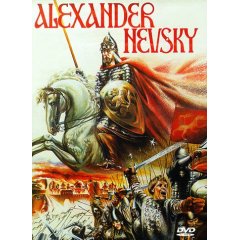 Plot Synopsis: It is the 13th century, and Russia is overrun by foreign invaders. A Russian knyaz', or prince, Alexander Nevsky, rallies the people to form a ragtag army to drive back an invasion by the Teutonic knights. This is a true story based on the actual battle at a lake near Novgorod.
Plot Synopsis: It is the 13th century, and Russia is overrun by foreign invaders. A Russian knyaz', or prince, Alexander Nevsky, rallies the people to form a ragtag army to drive back an invasion by the Teutonic knights. This is a true story based on the actual battle at a lake near Novgorod.
Amazon.com essential video
Sergei Eisenstein's landmark tale of Russia thwarting the German invasion of the 13th century was wildly popular and quite intentional, given the prevailing Nazi geopolitical advancement and destruction at the time. It can still be viewed as a masterful use of imagery and music, with the Battle on the Ice sequence as the obvious highlight. Unfortunately, the rest of the film pales in comparison. A great score by Prokofiev was effectively integrated by the Russian filmmaker, but stands on its own merit as well. --Bill Desowitz
DVD Description
Director Sergei Eisenstein's epic "Alexander Nevsky" features some of the most beautiful imagery ever put on film, a majestic music score by Prokifiev and a dazzling, climactic battle on a frozen lake.
______________________________________________________
Andrei Rublev - Andrei Tarkovsky
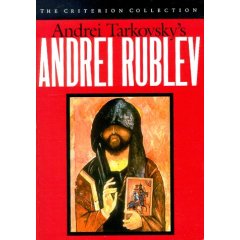 Plot Synopsis: Andreiv Rublev charts the life of the great icon painter through a turbulent period of 15th Century Russian history, a period marked by endless fighting between rival Princes and by Tatar invasions.
Plot Synopsis: Andreiv Rublev charts the life of the great icon painter through a turbulent period of 15th Century Russian history, a period marked by endless fighting between rival Princes and by Tatar invasions.
Amazon.com
At last, the complete version of Andrei Tarkovski's 1966 masterpiece about the great 15th century Russian icon painter (a film suppressed by the Soviet Union and unseen until 1971) is available. It's a complex and demanding narrative about the responsibility of the artist to participate in history rather than documenting it from a safe distance. A landmark in Russian cinema, Andrei Rublev is a beautifully lyrical black-and-white film about harmony and soulful expression. As the late filmmaker says in a supplementary interview, each generation must experience life for itself; it cannot simply absorb what has preceded it. In fact, a whole host of supplements accompanies the film in this Criterion Collection release. Stick with it; it's worth the effort. --Bill Desowitz
DVD Description
Immediately suppressed by the Soviets in 1966, Andrei Tarkovsky's epic masterpiece is a sweeping medieval tale of Russia's greatest icon painter. Too experimental, too frightening, too violent, and too politically complicated to be released officially, Andrei Rublev has existed only in shortened, censored versions until the Criterion Collection created this complete 205-minute director's cut special edition, now available for the first time on DVD.
______________________________________________________
Battleship Potemkin - Sergei M. Eisenstein and Grigori Aleksandrov
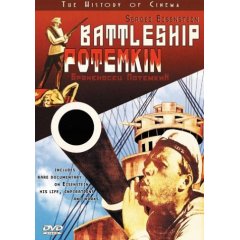 Plot Synopsis: Based on the historical events the movie tells the story of a riot at the battleship Potemkin. What started as a protest strike when the crew was given rotten meat for dinner ended in a riot. The sailors raised the red flag and tried to ignite the revolution in their home port Odessa.
Plot Synopsis: Based on the historical events the movie tells the story of a riot at the battleship Potemkin. What started as a protest strike when the crew was given rotten meat for dinner ended in a riot. The sailors raised the red flag and tried to ignite the revolution in their home port Odessa.
Amazon.com essential video
Sergei Eisenstein's revolutionary sophomore feature has so long stood as a textbook example of montage editing that many have forgotten what an invigoratingly cinematic experience he created. A 20th-anniversary tribute to the 1905 revolution, Eisenstein portrays the revolt in microcosm with a dramatization of the real-life mutiny aboard the battleship Potemkin. The story tells a familiar party-line message of the oppressed working class (in this case the enlisted sailors) banding together to overthrow their oppressors (the ship's officers), led by proto-revolutionary Vakulinchuk. When he dies in the shipboard struggle the crew lays his body to rest on the pier, a moody, moving scene where the citizens of Odessa slowly emerge from the fog to pay their respects. As the crowd grows Eisenstein turns the tenor from mourning a fallen comrade to celebrating the collective achievement. The government responds by sending soldiers and ships to deal with the mutinous crew and the supportive townspeople, which climaxes in the justly famous (and often imitated and parodied) Odessa Steps massacre. Eisenstein edits carefully orchestrated motions within the frame to create broad swaths of movement, shots of varying length to build the rhythm, close-ups for perspective and shock effect, and symbolic imagery for commentary, all to create one of the most cinematically exciting sequences in film history. Eisenstein's film is Marxist propaganda to be sure, but the power of this masterpiece lies not in its preaching but its poetry. --Sean Axmaker
DVD Description
Stylistically, The Battleship Potemkin serves as a revolutionary film, not only in its subject matter, but also in its unique use of montage. As a pioneer who championed a new purpose for cinema, Eisenstein proposed a "kino fist" approach to filmmaking, one in which the film attacks the viewer’s senses with symbolic metaphors, rhythmic editing, and highly-charged melodrama. Includes a rare documentary on Eisentein.
______________________________________________________
Dersu Uzala - Akira Kurosawa
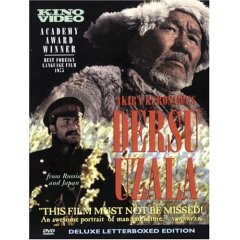 Plot Synopsis: A Russian army explorer who is rescued in Siberia by a rugged Asiatic hunter renews his friendship with the woodsman years later when he returns at the head of a larger expedition. The hunter finds that all his nature lore is of no help when he accompanies the explorer back to civilisation.
Plot Synopsis: A Russian army explorer who is rescued in Siberia by a rugged Asiatic hunter renews his friendship with the woodsman years later when he returns at the head of a larger expedition. The hunter finds that all his nature lore is of no help when he accompanies the explorer back to civilisation.
Amazon.com essential video
During an unusual chapter in the career of director Akira Kurosawa (Rashomon), the filmmaker went to Russia because he found working in his native Japan to be too difficult. The result was this striking 1975 near-epic based on the turn-of-the-century autobiographical novels of a military explorer (Yuri Solomin) who met and befriended a Goldi man in Russia's unmapped forests. Kurosawa traces the evolution of a deep and abiding bond between the two men, one civilized in the usual sense, the other at home in the sub-zero Siberian woods. There's no question that Dersu Uzala (the film is named for the Goldi character, played by Maxim Munzuk) has the muscular, imaginative look of a large-canvas Soviet Mosfilm from the 1970s. But in its energy and insight it is absolutely Kurosawa, from its implicit fascination with the meeting of opposite worlds to certain moments of tranquility and visual splendor. But nothing looks like Kurosawa more than a magnificent action sequence in which the co-heroes fight against time and exhaustion to stay alive in a wicked snowstorm. For fans of the late legend, this is a Kurosawa not to be missed. --Tom Keogh
DVD Description
Against a backdrop of the treacherous mountains, rivers and icy plains of the Siberian wilderness, acclaimed Japanese director Akira Kurosawa (The Seven Samurai, Rashomon) stages an extraordinary adventure of comradeship and survival. Winner of the Academy Award for Best Foreign Language Film.
______________________________________________________
Destiny of a Man - Sergei Bondarchuk
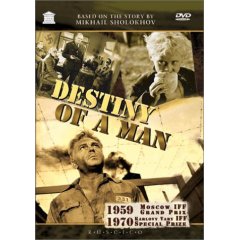 Plot Synopsis: The story of a man (Andrey Sokolov) whose life was ruthlessly crippled by World War II. His wife and daughter were killed during the bombing of his village, he spent some time as a prisoner, and his only son was killed in action only a few days before the victory...
Plot Synopsis: The story of a man (Andrey Sokolov) whose life was ruthlessly crippled by World War II. His wife and daughter were killed during the bombing of his village, he spent some time as a prisoner, and his only son was killed in action only a few days before the victory...
DVD Description
A hymn to the human spirit, this screen adaptation from the novel by Nobel Prize winner Mikhail Sholokhov. After losing his wife and children during the war with fascist Germany and surviving the horrors of a concentration camp, Andrei Sokolov (played by the film's honored director, War and Peace's Sergei Bondarchuk) marches with the Soviet Army towards Berlin and finds a new destiny with a young orphaned boy. Winner of the Grand Prize at the 1959 Moscow IFF and Special Diploma at the 1970 Karlovy Vary IFF.
______________________________________________________
Father of a Soldier - Rezo Chkheidze
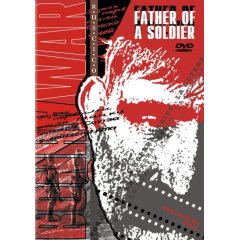 DVD Description
DVD Description
This moving study of war's inhumanity follows the wrenching journey of Georgy, an old peasant winegrower who travels to see his wounded soldier son in the hospital. However, the son has already been sent back out to the front, sending Georgy on a trek with the Soviety Army all the way to Berlin to witness the toppling of fascism. This beautifully filmed and acted Soviet classic in the tradition of "The Cranes Are Flying" remains a pioneering work of cinematic art.
_____________________________________________________
Ivan's Childhood - Andrei Tarkovsky
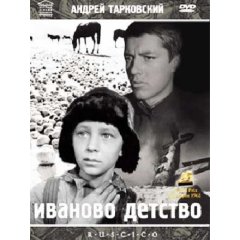 DVD Description
DVD Description
The first full-length feature film by the Great Russian director Andrei Tarkovsky. It caused a popular sensation in cinema world. The film was highly praised by the great 20th-century French writer Jean-Paul Sartre. It got various comments from prominent international cultural figures who admitted that the world had not yet seen such a powerful motion picture about war. The 12-year-old Ivan's childhood ended the day the Fascists shot his mother and sister right before his eyes. Ivan's father was killed in the war. The orphaned boy joins an army detachment, becoming an elusive scout. Risking his life, he brings to his commanders invaluable information about the enemy. But one day he does not come back from his mission...
Awards: St. Mark's Golden Lion at the Venice IFF, 1962; Golden Gate Prize for Best Director at the San Francisco IFF, 1963; Special Diploma at the Karlovy Vary IFF, 1970.
______________________________________________________
Ivan the Terrible Pt.1 - Sergei M. Eisenstein
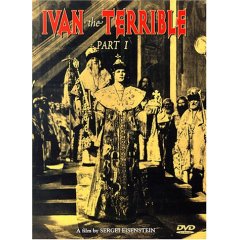 Plot Synopsis: In 1547, Ivan IV (1530-1584), archduke of Moscow, crowns himself Tsar of Russia and sets about reclaiming lost Russian territory. In scenes of his coronation, his wedding to Anastasia, his campaign against the Tartars in Kazan, his illness when all think he will die, recovery, campaigns in the Baltic and Crimea, self-imposed exile in Alexandrov, and the petition of Muscovites that he return, his enemies among the boyars threaten his success. Chief among them are his aunt, who wants to advance the fortunes of her son, a simpleton, and Kurbsky, a warrior prince who wants both power and the hand of Anastasia. Ivan deftly plays to the people to consolidate his power.
Plot Synopsis: In 1547, Ivan IV (1530-1584), archduke of Moscow, crowns himself Tsar of Russia and sets about reclaiming lost Russian territory. In scenes of his coronation, his wedding to Anastasia, his campaign against the Tartars in Kazan, his illness when all think he will die, recovery, campaigns in the Baltic and Crimea, self-imposed exile in Alexandrov, and the petition of Muscovites that he return, his enemies among the boyars threaten his success. Chief among them are his aunt, who wants to advance the fortunes of her son, a simpleton, and Kurbsky, a warrior prince who wants both power and the hand of Anastasia. Ivan deftly plays to the people to consolidate his power.
Amazon.com
A biography of the first czar of Russia was the final movie project of the great Sergei Eisenstein's life. It would be his undoing, as Stalin was not pleased with part II of this epic. But Ivan the Terrible, Part I still stands as a magnificent, rich, and strange achievement. This is a "composed" film to make Hitchcock look slapdash; every frame is arranged with the eye of a painter or choreographer, the mise-en-scène so deliberately artificial that even the actors' bodies become elements of style. (They complained about contorting themselves to fit Eisenstein's designs.) If you don't believe movies can be art, this could be (and has been) dismissed as ludicrous. But Eisenstein's command of light and shadow becomes its own justification, as the fascinating court intrigue plays out in a series of dynamic, eye-filling scenes. This is not a political theorist, but a director drunk on pure cinema. --Robert Horton
DVD Description
Part One of Sergei Eisenstein's two-part epic chronicling the life of the 16th Century Tsar, Ivan Grozny, is one of film's most artistic and absorbing creations. Over three years in the making, "Ivan the Terrible" features an operatic score by the esteemed Soviet composer Sergei Prokofiev.
______________________________________________________
Ivan the Terrible Pt.2 - Sergei M. Eisenstein and M. Filimmonova
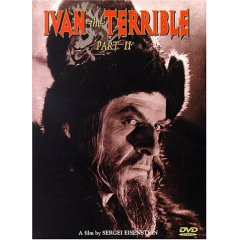 Plot Synopsis: His wife dead from poisoning and his chief warrior, Kurbsky, defected to the Poles, Ivan is lonely as he pursues a unified Russia with no foreign occupiers. Needing friendship, he brings to court Kolychev, now Philip the monk, and makes him metropolitan bishop of Moscow. Philip, however, takes his cues from the boyars and tries to bend Ivan to the will of the church. Ivan faces down Philip and lets loose his private force, the Oprichniks, on the boyars. Led by the Tsar's aunt, Euphrosyne, the boyers plot to assassinate Ivan and enthrone her son, Vladimir. At a banquet, Ivan mockingly crowns Vladimir and sends him in royal robes into the cathedral where the assassin awaits.
Plot Synopsis: His wife dead from poisoning and his chief warrior, Kurbsky, defected to the Poles, Ivan is lonely as he pursues a unified Russia with no foreign occupiers. Needing friendship, he brings to court Kolychev, now Philip the monk, and makes him metropolitan bishop of Moscow. Philip, however, takes his cues from the boyars and tries to bend Ivan to the will of the church. Ivan faces down Philip and lets loose his private force, the Oprichniks, on the boyars. Led by the Tsar's aunt, Euphrosyne, the boyers plot to assassinate Ivan and enthrone her son, Vladimir. At a banquet, Ivan mockingly crowns Vladimir and sends him in royal robes into the cathedral where the assassin awaits.
Amazon.com
Sergei Eisenstein's saga of Czar Ivan IV continues with the struggle for power and the use of secret police, a controversial segment that caused the film to be banned by Stalin in 1946 (the film was not released until 1958). The predominantly black-and-white film features a banquet dance sequence in color. Obviously the two parts must be viewed as a whole to be fully appreciated. Many film historians consider this period in Eisenstein's career less interesting than his silent period because of a sentimental return to archaic forms (characteristic of Soviet society in the '30s and '40s). Perhaps it was just part of his maturity. --Bill Desowitz
DVD Description
Part Two of Sergei Eisenstein's two-part epic chronicling the life of the 16th Century Tsar, Ivan Grozny, is one of film's most artistic and absorbing creations. Over three years in the making, "Ivan the Terrible" features an operatic score by the esteemed Soviet composer Sergei Prokofiev.
______________________________________________________
Solaris - Andrei Tarkovsky
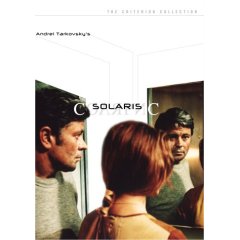 Amazon.com
Amazon.com
 Plot Synopsis: It is the 13th century, and Russia is overrun by foreign invaders. A Russian knyaz', or prince, Alexander Nevsky, rallies the people to form a ragtag army to drive back an invasion by the Teutonic knights. This is a true story based on the actual battle at a lake near Novgorod.
Plot Synopsis: It is the 13th century, and Russia is overrun by foreign invaders. A Russian knyaz', or prince, Alexander Nevsky, rallies the people to form a ragtag army to drive back an invasion by the Teutonic knights. This is a true story based on the actual battle at a lake near Novgorod.Amazon.com essential video
Sergei Eisenstein's landmark tale of Russia thwarting the German invasion of the 13th century was wildly popular and quite intentional, given the prevailing Nazi geopolitical advancement and destruction at the time. It can still be viewed as a masterful use of imagery and music, with the Battle on the Ice sequence as the obvious highlight. Unfortunately, the rest of the film pales in comparison. A great score by Prokofiev was effectively integrated by the Russian filmmaker, but stands on its own merit as well. --Bill Desowitz
DVD Description
Director Sergei Eisenstein's epic "Alexander Nevsky" features some of the most beautiful imagery ever put on film, a majestic music score by Prokifiev and a dazzling, climactic battle on a frozen lake.
______________________________________________________
Andrei Rublev - Andrei Tarkovsky
 Plot Synopsis: Andreiv Rublev charts the life of the great icon painter through a turbulent period of 15th Century Russian history, a period marked by endless fighting between rival Princes and by Tatar invasions.
Plot Synopsis: Andreiv Rublev charts the life of the great icon painter through a turbulent period of 15th Century Russian history, a period marked by endless fighting between rival Princes and by Tatar invasions.Amazon.com
At last, the complete version of Andrei Tarkovski's 1966 masterpiece about the great 15th century Russian icon painter (a film suppressed by the Soviet Union and unseen until 1971) is available. It's a complex and demanding narrative about the responsibility of the artist to participate in history rather than documenting it from a safe distance. A landmark in Russian cinema, Andrei Rublev is a beautifully lyrical black-and-white film about harmony and soulful expression. As the late filmmaker says in a supplementary interview, each generation must experience life for itself; it cannot simply absorb what has preceded it. In fact, a whole host of supplements accompanies the film in this Criterion Collection release. Stick with it; it's worth the effort. --Bill Desowitz
DVD Description
Immediately suppressed by the Soviets in 1966, Andrei Tarkovsky's epic masterpiece is a sweeping medieval tale of Russia's greatest icon painter. Too experimental, too frightening, too violent, and too politically complicated to be released officially, Andrei Rublev has existed only in shortened, censored versions until the Criterion Collection created this complete 205-minute director's cut special edition, now available for the first time on DVD.
______________________________________________________
Battleship Potemkin - Sergei M. Eisenstein and Grigori Aleksandrov
 Plot Synopsis: Based on the historical events the movie tells the story of a riot at the battleship Potemkin. What started as a protest strike when the crew was given rotten meat for dinner ended in a riot. The sailors raised the red flag and tried to ignite the revolution in their home port Odessa.
Plot Synopsis: Based on the historical events the movie tells the story of a riot at the battleship Potemkin. What started as a protest strike when the crew was given rotten meat for dinner ended in a riot. The sailors raised the red flag and tried to ignite the revolution in their home port Odessa.Amazon.com essential video
Sergei Eisenstein's revolutionary sophomore feature has so long stood as a textbook example of montage editing that many have forgotten what an invigoratingly cinematic experience he created. A 20th-anniversary tribute to the 1905 revolution, Eisenstein portrays the revolt in microcosm with a dramatization of the real-life mutiny aboard the battleship Potemkin. The story tells a familiar party-line message of the oppressed working class (in this case the enlisted sailors) banding together to overthrow their oppressors (the ship's officers), led by proto-revolutionary Vakulinchuk. When he dies in the shipboard struggle the crew lays his body to rest on the pier, a moody, moving scene where the citizens of Odessa slowly emerge from the fog to pay their respects. As the crowd grows Eisenstein turns the tenor from mourning a fallen comrade to celebrating the collective achievement. The government responds by sending soldiers and ships to deal with the mutinous crew and the supportive townspeople, which climaxes in the justly famous (and often imitated and parodied) Odessa Steps massacre. Eisenstein edits carefully orchestrated motions within the frame to create broad swaths of movement, shots of varying length to build the rhythm, close-ups for perspective and shock effect, and symbolic imagery for commentary, all to create one of the most cinematically exciting sequences in film history. Eisenstein's film is Marxist propaganda to be sure, but the power of this masterpiece lies not in its preaching but its poetry. --Sean Axmaker
DVD Description
Stylistically, The Battleship Potemkin serves as a revolutionary film, not only in its subject matter, but also in its unique use of montage. As a pioneer who championed a new purpose for cinema, Eisenstein proposed a "kino fist" approach to filmmaking, one in which the film attacks the viewer’s senses with symbolic metaphors, rhythmic editing, and highly-charged melodrama. Includes a rare documentary on Eisentein.
______________________________________________________
Dersu Uzala - Akira Kurosawa
 Plot Synopsis: A Russian army explorer who is rescued in Siberia by a rugged Asiatic hunter renews his friendship with the woodsman years later when he returns at the head of a larger expedition. The hunter finds that all his nature lore is of no help when he accompanies the explorer back to civilisation.
Plot Synopsis: A Russian army explorer who is rescued in Siberia by a rugged Asiatic hunter renews his friendship with the woodsman years later when he returns at the head of a larger expedition. The hunter finds that all his nature lore is of no help when he accompanies the explorer back to civilisation.Amazon.com essential video
During an unusual chapter in the career of director Akira Kurosawa (Rashomon), the filmmaker went to Russia because he found working in his native Japan to be too difficult. The result was this striking 1975 near-epic based on the turn-of-the-century autobiographical novels of a military explorer (Yuri Solomin) who met and befriended a Goldi man in Russia's unmapped forests. Kurosawa traces the evolution of a deep and abiding bond between the two men, one civilized in the usual sense, the other at home in the sub-zero Siberian woods. There's no question that Dersu Uzala (the film is named for the Goldi character, played by Maxim Munzuk) has the muscular, imaginative look of a large-canvas Soviet Mosfilm from the 1970s. But in its energy and insight it is absolutely Kurosawa, from its implicit fascination with the meeting of opposite worlds to certain moments of tranquility and visual splendor. But nothing looks like Kurosawa more than a magnificent action sequence in which the co-heroes fight against time and exhaustion to stay alive in a wicked snowstorm. For fans of the late legend, this is a Kurosawa not to be missed. --Tom Keogh
DVD Description
Against a backdrop of the treacherous mountains, rivers and icy plains of the Siberian wilderness, acclaimed Japanese director Akira Kurosawa (The Seven Samurai, Rashomon) stages an extraordinary adventure of comradeship and survival. Winner of the Academy Award for Best Foreign Language Film.
______________________________________________________
Destiny of a Man - Sergei Bondarchuk
 Plot Synopsis: The story of a man (Andrey Sokolov) whose life was ruthlessly crippled by World War II. His wife and daughter were killed during the bombing of his village, he spent some time as a prisoner, and his only son was killed in action only a few days before the victory...
Plot Synopsis: The story of a man (Andrey Sokolov) whose life was ruthlessly crippled by World War II. His wife and daughter were killed during the bombing of his village, he spent some time as a prisoner, and his only son was killed in action only a few days before the victory...DVD Description
A hymn to the human spirit, this screen adaptation from the novel by Nobel Prize winner Mikhail Sholokhov. After losing his wife and children during the war with fascist Germany and surviving the horrors of a concentration camp, Andrei Sokolov (played by the film's honored director, War and Peace's Sergei Bondarchuk) marches with the Soviet Army towards Berlin and finds a new destiny with a young orphaned boy. Winner of the Grand Prize at the 1959 Moscow IFF and Special Diploma at the 1970 Karlovy Vary IFF.
______________________________________________________
Father of a Soldier - Rezo Chkheidze
 DVD Description
DVD DescriptionThis moving study of war's inhumanity follows the wrenching journey of Georgy, an old peasant winegrower who travels to see his wounded soldier son in the hospital. However, the son has already been sent back out to the front, sending Georgy on a trek with the Soviety Army all the way to Berlin to witness the toppling of fascism. This beautifully filmed and acted Soviet classic in the tradition of "The Cranes Are Flying" remains a pioneering work of cinematic art.
_____________________________________________________
Ivan's Childhood - Andrei Tarkovsky
 DVD Description
DVD DescriptionThe first full-length feature film by the Great Russian director Andrei Tarkovsky. It caused a popular sensation in cinema world. The film was highly praised by the great 20th-century French writer Jean-Paul Sartre. It got various comments from prominent international cultural figures who admitted that the world had not yet seen such a powerful motion picture about war. The 12-year-old Ivan's childhood ended the day the Fascists shot his mother and sister right before his eyes. Ivan's father was killed in the war. The orphaned boy joins an army detachment, becoming an elusive scout. Risking his life, he brings to his commanders invaluable information about the enemy. But one day he does not come back from his mission...
Awards: St. Mark's Golden Lion at the Venice IFF, 1962; Golden Gate Prize for Best Director at the San Francisco IFF, 1963; Special Diploma at the Karlovy Vary IFF, 1970.
______________________________________________________
Ivan the Terrible Pt.1 - Sergei M. Eisenstein
 Plot Synopsis: In 1547, Ivan IV (1530-1584), archduke of Moscow, crowns himself Tsar of Russia and sets about reclaiming lost Russian territory. In scenes of his coronation, his wedding to Anastasia, his campaign against the Tartars in Kazan, his illness when all think he will die, recovery, campaigns in the Baltic and Crimea, self-imposed exile in Alexandrov, and the petition of Muscovites that he return, his enemies among the boyars threaten his success. Chief among them are his aunt, who wants to advance the fortunes of her son, a simpleton, and Kurbsky, a warrior prince who wants both power and the hand of Anastasia. Ivan deftly plays to the people to consolidate his power.
Plot Synopsis: In 1547, Ivan IV (1530-1584), archduke of Moscow, crowns himself Tsar of Russia and sets about reclaiming lost Russian territory. In scenes of his coronation, his wedding to Anastasia, his campaign against the Tartars in Kazan, his illness when all think he will die, recovery, campaigns in the Baltic and Crimea, self-imposed exile in Alexandrov, and the petition of Muscovites that he return, his enemies among the boyars threaten his success. Chief among them are his aunt, who wants to advance the fortunes of her son, a simpleton, and Kurbsky, a warrior prince who wants both power and the hand of Anastasia. Ivan deftly plays to the people to consolidate his power.Amazon.com
A biography of the first czar of Russia was the final movie project of the great Sergei Eisenstein's life. It would be his undoing, as Stalin was not pleased with part II of this epic. But Ivan the Terrible, Part I still stands as a magnificent, rich, and strange achievement. This is a "composed" film to make Hitchcock look slapdash; every frame is arranged with the eye of a painter or choreographer, the mise-en-scène so deliberately artificial that even the actors' bodies become elements of style. (They complained about contorting themselves to fit Eisenstein's designs.) If you don't believe movies can be art, this could be (and has been) dismissed as ludicrous. But Eisenstein's command of light and shadow becomes its own justification, as the fascinating court intrigue plays out in a series of dynamic, eye-filling scenes. This is not a political theorist, but a director drunk on pure cinema. --Robert Horton
DVD Description
Part One of Sergei Eisenstein's two-part epic chronicling the life of the 16th Century Tsar, Ivan Grozny, is one of film's most artistic and absorbing creations. Over three years in the making, "Ivan the Terrible" features an operatic score by the esteemed Soviet composer Sergei Prokofiev.
______________________________________________________
Ivan the Terrible Pt.2 - Sergei M. Eisenstein and M. Filimmonova
 Plot Synopsis: His wife dead from poisoning and his chief warrior, Kurbsky, defected to the Poles, Ivan is lonely as he pursues a unified Russia with no foreign occupiers. Needing friendship, he brings to court Kolychev, now Philip the monk, and makes him metropolitan bishop of Moscow. Philip, however, takes his cues from the boyars and tries to bend Ivan to the will of the church. Ivan faces down Philip and lets loose his private force, the Oprichniks, on the boyars. Led by the Tsar's aunt, Euphrosyne, the boyers plot to assassinate Ivan and enthrone her son, Vladimir. At a banquet, Ivan mockingly crowns Vladimir and sends him in royal robes into the cathedral where the assassin awaits.
Plot Synopsis: His wife dead from poisoning and his chief warrior, Kurbsky, defected to the Poles, Ivan is lonely as he pursues a unified Russia with no foreign occupiers. Needing friendship, he brings to court Kolychev, now Philip the monk, and makes him metropolitan bishop of Moscow. Philip, however, takes his cues from the boyars and tries to bend Ivan to the will of the church. Ivan faces down Philip and lets loose his private force, the Oprichniks, on the boyars. Led by the Tsar's aunt, Euphrosyne, the boyers plot to assassinate Ivan and enthrone her son, Vladimir. At a banquet, Ivan mockingly crowns Vladimir and sends him in royal robes into the cathedral where the assassin awaits.Amazon.com
Sergei Eisenstein's saga of Czar Ivan IV continues with the struggle for power and the use of secret police, a controversial segment that caused the film to be banned by Stalin in 1946 (the film was not released until 1958). The predominantly black-and-white film features a banquet dance sequence in color. Obviously the two parts must be viewed as a whole to be fully appreciated. Many film historians consider this period in Eisenstein's career less interesting than his silent period because of a sentimental return to archaic forms (characteristic of Soviet society in the '30s and '40s). Perhaps it was just part of his maturity. --Bill Desowitz
DVD Description
Part Two of Sergei Eisenstein's two-part epic chronicling the life of the 16th Century Tsar, Ivan Grozny, is one of film's most artistic and absorbing creations. Over three years in the making, "Ivan the Terrible" features an operatic score by the esteemed Soviet composer Sergei Prokofiev.
______________________________________________________
Solaris - Andrei Tarkovsky
 Amazon.com
Amazon.com The Russian answer to 2001, and very nearly as memorable a movie. The legendary Russian director Andrei Tarkovsky made this extremely deliberate science-fiction epic, an adaptation of a novel by Stanislaw Lem. The story follows a cosmonaut (Donatas Banionis) on an eerie trip to a planet where haunting memories can take physical form. Its bare outline makes it sound like a routine space-flight picture, an elongated Twilight Zone episode; but the further into its mysteries we travel, the less familiar anything seems. Even though Tarkovsky's meanings and methods are sometimes mystifying, Solaris has a way of crawling inside your head, especially given the slow pace and general lack of forward momentum. By the time the final images cross the screen, Tarkovsky has gone way beyond SF conventions into a moving, unsettling vision of memory and home. Well worthy of cult status, Solaris is both challenging art-house fare and a whacked-out head trip. --Robert Horton
______________________________________________________
Stalker - Andrei Tarkovsky
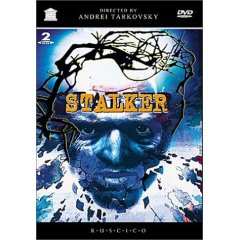 Plot Synopsis: Near a gray and unnamed city is the Zone, an alien place guarded by barbed wire and soldiers. Over his wife's numerous objections, a man rises in the dead of night: he's a stalker, one of a handful who have the mental gifts (and who risk imprisonment) to lead people into the Zone to the Room, a place where one's secret hopes come true. That night, he takes two people into the Zone: a popular writer who is burned out, cynical, and questioning his genius; and a quiet scientist more concerned about his knapsack than the journey. In the deserted Zone, the approach to the Room must be indirect. As they draw near, the rules seem to change and the stalker faces a crisis.
Plot Synopsis: Near a gray and unnamed city is the Zone, an alien place guarded by barbed wire and soldiers. Over his wife's numerous objections, a man rises in the dead of night: he's a stalker, one of a handful who have the mental gifts (and who risk imprisonment) to lead people into the Zone to the Room, a place where one's secret hopes come true. That night, he takes two people into the Zone: a popular writer who is burned out, cynical, and questioning his genius; and a quiet scientist more concerned about his knapsack than the journey. In the deserted Zone, the approach to the Room must be indirect. As they draw near, the rules seem to change and the stalker faces a crisis.
DVD Description
This science fiction milestone from director Andrei Tarkovsky (Solaris) takes you into the Zone, a mysterious, guarded realm containing a mystical Room in which occupants' secret dreams come true. Stalker, a man able to lead others to this holy grail, escorts a writer and a scientist through this foreboding territory and confronts several unexpected challenges along the way. Based on the novel "Roadside Picnic" by Russian sci-fi writers Arkady and Boris Strugatsky.
______________________________________________________
Strike - Sergei M. Eisenstein
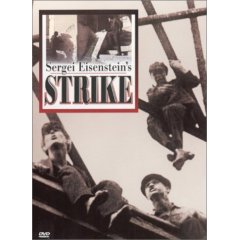 Plot Synopsis: In Russia's factory region during Czarist rule, there's restlessness and strike planning among workers; management brings in spies and external agents. When a worker hangs himself after being falsely accused of thievery, the workers strike. At first, there's excitement in workers' households and in public places as they develop their demands communally. Then, as the strike drags on and management rejects demands, hunger mounts, as does domestic and civic distress. Provocateurs recruited from the lumpen and in league with the police and the fire department bring problems to the workers; the spies do their dirty work; and, the military arrives to liquidate strikers.
Plot Synopsis: In Russia's factory region during Czarist rule, there's restlessness and strike planning among workers; management brings in spies and external agents. When a worker hangs himself after being falsely accused of thievery, the workers strike. At first, there's excitement in workers' households and in public places as they develop their demands communally. Then, as the strike drags on and management rejects demands, hunger mounts, as does domestic and civic distress. Provocateurs recruited from the lumpen and in league with the police and the fire department bring problems to the workers; the spies do their dirty work; and, the military arrives to liquidate strikers.
Amazon.com essential video
Sergei Eisenstein's debut film is more than a landmark of Soviet cinema; it's easily one of the most thrilling and inventive films to emerge from the silent era of Russian filmmaking. Eisenstein was a theater director and stage designer with some very specific ideas about the cinema, and he put them into practice telling the story of a worker's strike in pre-Revolution Russia, portraying the struggle not of leader against leader, but of the proletariat against the factory owners, enlivened by a conspiratorial subplot involving a quartet of insidious spies sent to infiltrate the ranks of labor. The subject matter is at times didactic and the acting often hammy and overwrought, but the technique is vibrant and the images striking. Eisenstein's compositions reflect the graphic boldness of contemporary poster art, mixing poetic realism with grotesque expressionism in a gripping style, and his famous montage editing style (to be perfected in his next film, Potemkin) is raw, experimental, and energetic. Eisenstein's later films are more consistent and elegant, but none of them have the sheer cinematic invention and energy of this first film. The new score composed and performed by the idiosyncratic Alloy Orchestra combines a mix of martial and mood music on synthesizer with the driving percussion of drums, wood blocks, bells, and wrecking yard of clanging metal objects--a dynamic soundtrack to one of the most auspicious directoral debuts ever. --Sean Axmaker
DVD Description
Sergei Eisenstein's "Strike," with Orson Welles' "Citizen Kane," mark the most outstanding cinematic debuts in the history of film. Triggered by the suicide of a worker unjustly accused of theft, a strike is called by the laborers of a Moscow factory. The managers, owner and the Czarist government dispatch infiltrators in an attempt to break the workers unity. Unsuccessful, they hire the police and, in the film's most harrowing and powerful sequences, the unarmed strikers are slaughtered in a brutal confrontation. This edition of "Strike" is digitally remastered from a mint-condition 35mm print made from the original camera negative and features new digital stereo music composed and performed by the Alloy Orchestra.
______________________________________________________
The Mirror - Andrei Tarkovsky
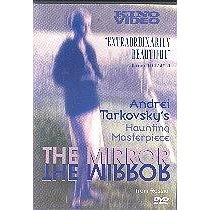 Plot Synopsis: The director mixes flashbacks, historical footage and original poetry to illustrate the reminiscences of a dying man about his childhood during World War II, adolescence, and a painful divorce in his family. The story interweaves reflections about Russian history and society.
Plot Synopsis: The director mixes flashbacks, historical footage and original poetry to illustrate the reminiscences of a dying man about his childhood during World War II, adolescence, and a painful divorce in his family. The story interweaves reflections about Russian history and society.
______________________________________________________
The Sacrifice - Andrei Tarkovsky
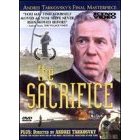 Plot Synopsis: Alexander, a journalist and former actor and philosopher, tells his little son how worried he is about the lack of spirituality of modern mankind. In the night of his birthday, the third world war breaks out. In his despair Alexander turns himself in a prayer to God, offering him everything to have the war not happened at all.
Plot Synopsis: Alexander, a journalist and former actor and philosopher, tells his little son how worried he is about the lack of spirituality of modern mankind. In the night of his birthday, the third world war breaks out. In his despair Alexander turns himself in a prayer to God, offering him everything to have the war not happened at all.
Stalker - Andrei Tarkovsky
 Plot Synopsis: Near a gray and unnamed city is the Zone, an alien place guarded by barbed wire and soldiers. Over his wife's numerous objections, a man rises in the dead of night: he's a stalker, one of a handful who have the mental gifts (and who risk imprisonment) to lead people into the Zone to the Room, a place where one's secret hopes come true. That night, he takes two people into the Zone: a popular writer who is burned out, cynical, and questioning his genius; and a quiet scientist more concerned about his knapsack than the journey. In the deserted Zone, the approach to the Room must be indirect. As they draw near, the rules seem to change and the stalker faces a crisis.
Plot Synopsis: Near a gray and unnamed city is the Zone, an alien place guarded by barbed wire and soldiers. Over his wife's numerous objections, a man rises in the dead of night: he's a stalker, one of a handful who have the mental gifts (and who risk imprisonment) to lead people into the Zone to the Room, a place where one's secret hopes come true. That night, he takes two people into the Zone: a popular writer who is burned out, cynical, and questioning his genius; and a quiet scientist more concerned about his knapsack than the journey. In the deserted Zone, the approach to the Room must be indirect. As they draw near, the rules seem to change and the stalker faces a crisis.DVD Description
This science fiction milestone from director Andrei Tarkovsky (Solaris) takes you into the Zone, a mysterious, guarded realm containing a mystical Room in which occupants' secret dreams come true. Stalker, a man able to lead others to this holy grail, escorts a writer and a scientist through this foreboding territory and confronts several unexpected challenges along the way. Based on the novel "Roadside Picnic" by Russian sci-fi writers Arkady and Boris Strugatsky.
______________________________________________________
Strike - Sergei M. Eisenstein
 Plot Synopsis: In Russia's factory region during Czarist rule, there's restlessness and strike planning among workers; management brings in spies and external agents. When a worker hangs himself after being falsely accused of thievery, the workers strike. At first, there's excitement in workers' households and in public places as they develop their demands communally. Then, as the strike drags on and management rejects demands, hunger mounts, as does domestic and civic distress. Provocateurs recruited from the lumpen and in league with the police and the fire department bring problems to the workers; the spies do their dirty work; and, the military arrives to liquidate strikers.
Plot Synopsis: In Russia's factory region during Czarist rule, there's restlessness and strike planning among workers; management brings in spies and external agents. When a worker hangs himself after being falsely accused of thievery, the workers strike. At first, there's excitement in workers' households and in public places as they develop their demands communally. Then, as the strike drags on and management rejects demands, hunger mounts, as does domestic and civic distress. Provocateurs recruited from the lumpen and in league with the police and the fire department bring problems to the workers; the spies do their dirty work; and, the military arrives to liquidate strikers.Amazon.com essential video
Sergei Eisenstein's debut film is more than a landmark of Soviet cinema; it's easily one of the most thrilling and inventive films to emerge from the silent era of Russian filmmaking. Eisenstein was a theater director and stage designer with some very specific ideas about the cinema, and he put them into practice telling the story of a worker's strike in pre-Revolution Russia, portraying the struggle not of leader against leader, but of the proletariat against the factory owners, enlivened by a conspiratorial subplot involving a quartet of insidious spies sent to infiltrate the ranks of labor. The subject matter is at times didactic and the acting often hammy and overwrought, but the technique is vibrant and the images striking. Eisenstein's compositions reflect the graphic boldness of contemporary poster art, mixing poetic realism with grotesque expressionism in a gripping style, and his famous montage editing style (to be perfected in his next film, Potemkin) is raw, experimental, and energetic. Eisenstein's later films are more consistent and elegant, but none of them have the sheer cinematic invention and energy of this first film. The new score composed and performed by the idiosyncratic Alloy Orchestra combines a mix of martial and mood music on synthesizer with the driving percussion of drums, wood blocks, bells, and wrecking yard of clanging metal objects--a dynamic soundtrack to one of the most auspicious directoral debuts ever. --Sean Axmaker
DVD Description
Sergei Eisenstein's "Strike," with Orson Welles' "Citizen Kane," mark the most outstanding cinematic debuts in the history of film. Triggered by the suicide of a worker unjustly accused of theft, a strike is called by the laborers of a Moscow factory. The managers, owner and the Czarist government dispatch infiltrators in an attempt to break the workers unity. Unsuccessful, they hire the police and, in the film's most harrowing and powerful sequences, the unarmed strikers are slaughtered in a brutal confrontation. This edition of "Strike" is digitally remastered from a mint-condition 35mm print made from the original camera negative and features new digital stereo music composed and performed by the Alloy Orchestra.
______________________________________________________
The Mirror - Andrei Tarkovsky
 Plot Synopsis: The director mixes flashbacks, historical footage and original poetry to illustrate the reminiscences of a dying man about his childhood during World War II, adolescence, and a painful divorce in his family. The story interweaves reflections about Russian history and society.
Plot Synopsis: The director mixes flashbacks, historical footage and original poetry to illustrate the reminiscences of a dying man about his childhood during World War II, adolescence, and a painful divorce in his family. The story interweaves reflections about Russian history and society.______________________________________________________
The Sacrifice - Andrei Tarkovsky
 Plot Synopsis: Alexander, a journalist and former actor and philosopher, tells his little son how worried he is about the lack of spirituality of modern mankind. In the night of his birthday, the third world war breaks out. In his despair Alexander turns himself in a prayer to God, offering him everything to have the war not happened at all.
Plot Synopsis: Alexander, a journalist and former actor and philosopher, tells his little son how worried he is about the lack of spirituality of modern mankind. In the night of his birthday, the third world war breaks out. In his despair Alexander turns himself in a prayer to God, offering him everything to have the war not happened at all.
No comments:
Post a Comment